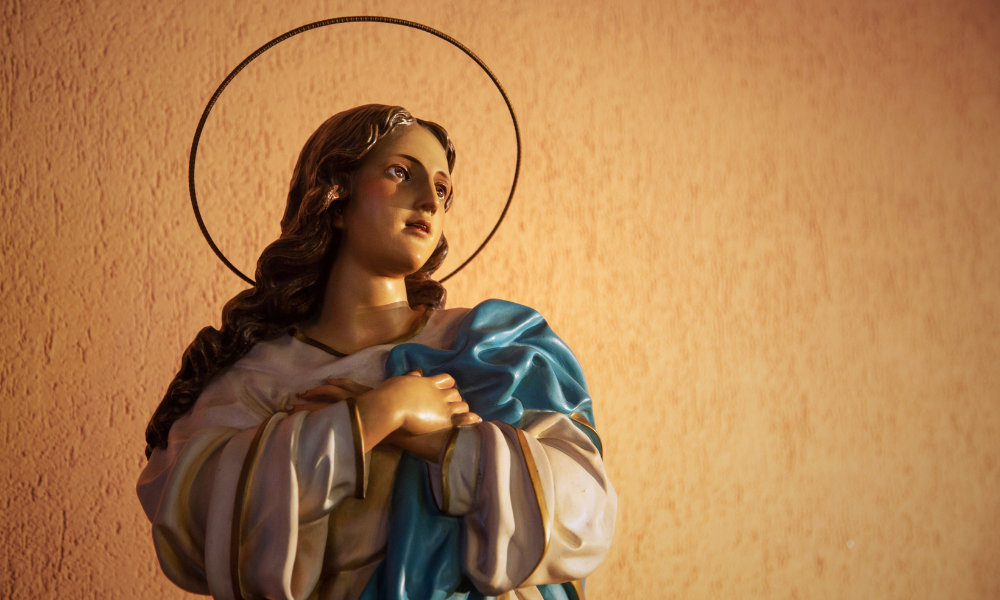
Rejoicing with Mary in May
The Church celebrates the Feast of the Visitation of the Blessed Virgin Mary on May 31. In the Gospel according to Luke, Mary, with child, hastily travels to the hill country to visit her cousin Elizabeth, who is also pregnant. Elizabeth, we will come to see, will have a son, named John. He will grow to be known as John the Baptist, the one who will foretell of the coming of the Messiah. Upon Mary’s arrival, “the infant leaped in [Elizabeth’s] womb,” recognizing the presence of the Messiah in their midst and causing Elizabeth to cry out a refrain we pray to this day: “Most blessed are you among women, and blessed is the fruit of your womb.” (Lk 1:39-45)
The Church celebrates the Feast of the Visitation of the Blessed Virgin Mary on May 31. In the Gospel according to Luke, Mary, with child, hastily travels to the hill country to visit her cousin Elizabeth, who is also pregnant. Elizabeth, we will come to see, will have a son, named John. He will grow to be known as John the Baptist, the one who will foretell of the coming of the Messiah. Upon Mary’s arrival, “the infant leaped in [Elizabeth’s] womb,” recognizing the presence of the Messiah in their midst and causing Elizabeth to cry out a refrain we pray to this day: “Most blessed are you among women, and blessed is the fruit of your womb.” (Lk 1:39-45)
Mary responds to Elizabeth’s exhortation with a song of praise and thanksgiving to God, and her words have become a prayer that Christians around the world now pray as part of the Liturgy of the Hours, although it can be recited or sung at any time.
The Magnificat
The Canticle of Mary, also known as the Magnificat, is a proclamation of praise straight from the Blessed Mother’s heart. It derives its name from the first line in the Latin, Magnificat anima mea Dominum. This is usually translated as “my soul magnifies the Lord” or “my soul proclaims the greatness of the Lord.”
A Meditation on the Magnificat
Reflecting upon the Magnificat can help us focus on the daily joy we can find as followers of Christ. Take this opportunity, in the month of May, to rejoice with Mary on the greatness of our Lord.
“My soul proclaims the greatness of the Lord; my spirit rejoices in God my savior.” Take a moment to really think about the grandeur and glory of God, and give thanks for the gift of salvation.
“For he has looked upon his handmaid’s lowliness; behold, from now on will all ages call me blessed.” God elevates the lowly. Throughout all of salvation history, God has chosen some of the least likely, the youngest, and the lowliest, to be his messengers and vehicles of grace.
“The Mighty One has done great things for me, and holy is his name.” There’s no doubt that God is great. Take a moment to reflect on all the things he has done in your life lately, and offer a prayer of thanksgiving.
“His mercy is from age to age to those who fear him.” God’s mercy is never-ending. Where has God’s mercy been particularly noticeable to you, and how can you be a reflection of God’s mercy to those in your life?
“He has shown might with his arm, dispersed the arrogant of mind and heart.” Rejoice and know that the Father is Lord, even in the most unsure and difficult of times and among the most challenging of people. At the end of the day, Christ has won our salvation for us.
“He has thrown down the rulers from their thrones but lifted up the lowly.” When it seems as though evil is winning over good, think of this verse. But this doesn’t apply only to rulers and leaders; think of your own life for a minute. Do your goals reflect a worldly life and selfish ego, or do they mirror God’s will for your life? Are you allowing God to be the ruler of your life every day so he may lift you up?
“The hungry he has filled with good things; the rich he has sent away empty.” Do you hunger for love and righteousness, or do you hunger for the things of this world, such as money and possessions? If it’s worldly items you crave, you will never be truly satisfied. Christ gave us the Eucharist to truly nourish us and fulfill our needs in God.
“He has helped Israel his servant, remembering his mercy, according to his promise to our fathers, to Abraham and to his descendants forever.” God’s covenant isn’t a quick and simple promise that has been long forgotten. It’s a forever kind of deal that he will never forget, even if we are unfaithful. As long as we seek him, he will never forsake us.
Mary’s Magnificat is a blueprint for us to remember to rejoice in her Son when joy seems hard to come by. It’s her plea for us to remember just who she brought into the world and a reminder to never stop praising God for his greatness and goodness.



